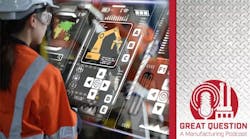Podcast: Why the Digital Plant Still Needs a Focus on its Human Workers
At IndustryWeek's recent Operations Leadership Summit in June, a panel discussed "Modern Tools for a Modern Workforce". Four experts dived in to explore the benefits of humans in an increasingly digital and connected workforce. In this episode of Great Question: A Manufacturing Podcast, Scott Achelpohl, managing editor of Smart Industry, shares the audience questions and expert answers from the session.
Below is an excerpt from the transcript:
We've been talking all week about people, process, and technology. We absolutely agree with that, and we would say even more importantly, it's in that order. You need the people, lifelong learners, that have a contribution mindset. Changing the work itself, using the power of new technology. It's all about data and technology, that's certainly the why and the why now, but the people and the work processes are the how. Our approach has been four work streams leading digital transformation across our 13 global sites. We start with learning and development, and in that effort, we're really trying to ban the word training because if my job is the trainer and you're the trainee, the onus is on me for you to get trained.
Learning is not just semantics. It is a whole different mental model. The onus is on the learner, and the tools have to be different. You have to present, enable tools that people can learn in their own way on their own pace. So, in this particular work stream, we've been taking great advantage of digital twins. We have asset digital twins, we have product digital twins, we have learning twins. We also have processed twins, and lately, in the last 12 months or so, we've been really driving Gen AI to those twins as a layer over top. So, the learner can use the generative AI and query the twin to give information back, and that's really been accelerating our learning. Our goal is to make people functional and capable in months, not years, because that's how you're going to be able to get to the workforce of the future. — Jerry Grunewald
